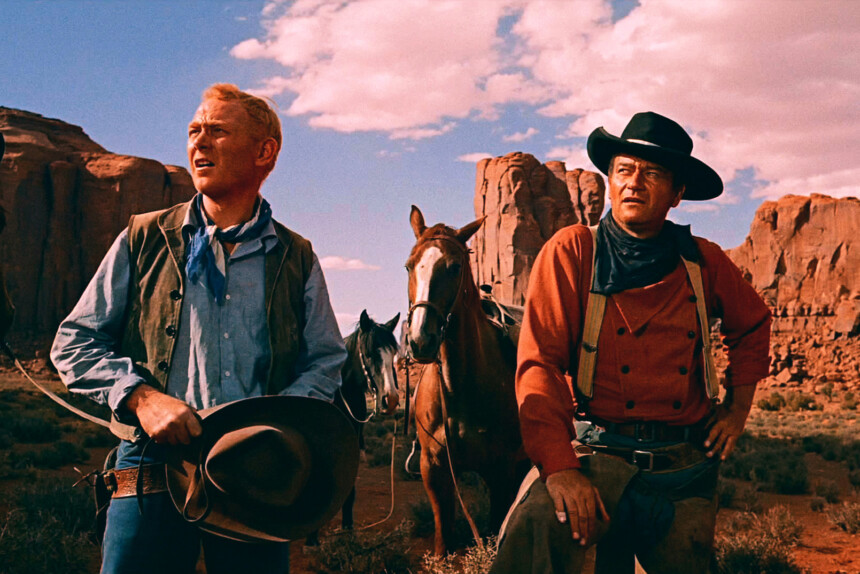I had the good fortune to talk regularly about movies with my good friend and conservative thinker Sam Francis. With intellectual heft, he generously shared what he had learned from his own moviegoing. What follows is offered in the same spirit: a list of 10 movies I have repeatedly enjoyed and unhesitatingly recommend.
The Searchers (1956): Francis introduced me to this John Ford masterpiece and the novel on which it was based. It bears repeated viewing as major themes are never discussed, much less explained. John Wayne’s performance as Ethan Edwards is brilliant, and today’s beleaguered Americans could do worse than consider some of what Edwards says, including this response about his apparent absence from the Confederate surrender three years before: “I don’t believe in surrenders. Nope, I’ve still got my saber, Reverend. Didn’t beat it into no plowshare, neither.”
A Man for All Seasons (1966): Paul Scofield gives a magnificent performance as Thomas More in this Fred Zinnemann screen adaptation of Robert Bolt’s play. It features some of the most eloquent dialogue ever filmed, including: “God made the angels to show Him splendor, as He made animals for innocence and plants for their simplicity. But Man He made to serve Him wittily, in the tangle of his mind.”
The Day of the Jackal (1973): Another film by Zinnemann, this is a tribute to men who take their jobs seriously and work hard to do them well, whether it’s the endlessly resourceful contract assassin hired to kill Charles de Gaulle, the unassuming yet brilliant police detective leading the task force to find the assassin, or the multitude of bureaucrats doing the mundane tasks needed to find the Jackal. The movie depicts a lost world that had yet to discover that “diversity is our greatest strength” and still thought that hard work was. It’s a tribute to the sort of men society now despises.
It’s A Wonderful Life (1946): The favorite movie of both its director Frank Capra and lead Jimmy Stewart, this film delivers the most powerful ending of any American movie. Its final 10-minute sequence overwhelmed me when I saw it the first time and causes me to tear up even now. Not at all a simplistic tale, it strains credulity only once, in asking us to believe that but for Stewart, Donna Reed was destined to be a spinster librarian.
Doctor Zhivago (1965): After seeing this movie several times, I finally saw it on the big screen and it was like seeing it for the first time, for director David Lean painted pictures with his camera. Robert Bolt wrote the screenplay, and it shows, including when Zhivago’s adoptive father exclaims, “I’m one of the people, too!” after the expropriation of his country house by the Communists, in the name of “the people.” I think of these words often when reading the news.
Rebecca (1940): I of course love director Alfred Hitchcock’s many masterpieces from later in his American career, but I have a special fondness for this, his first American film. It offers the suspense, tension, and surprise Hitchcock later perfected, as well as fine acting by the principals, although Hitchcock’s later villains do not match Judith Anderson and George Sanders in this film.
The Man Who Would Be King (1975): John Huston directed the perfectly cast Sean Connery, Michael Caine, Christopher Plummer, and Saeed Jaffrey in a story that conveys, in miniature, how comparative handfuls of Englishmen were able to subdue one land after another until one quarter of the planet was part of their empire. The ending is unforgettable in this, another of Francis’s favorites.
Dr. Strangelove (1964): Stanley Kubrick’s black comedy about the dangers of nuclear war is, in my experience, enjoyed most by American right-wingers. Peter Sellers, George C. Scott, and Sterling Hayden are brilliant and the dialogue is among the wittiest ever filmed. Today, though, the character of Strangelove seems somewhat less outlandish than it did in 1964, after living with the result of a Strangelove-like “gain of function” experiment in virology for nearly two years now.
Zulu (1964): This recounting of the Battle of Rorke’s Drift between the British Army and the Zulus is an impressive spectacle that shows respect to both sides—despite the fact that it was directed by a veritable Communist. The fact that it could not be made today is irrefutable proof of the West’s cultural decline. The clash of music presaging the final clash of arms is among the most stirring scenes ever filmed.
Shall We Dance (1997): This Japanese film opens with a middle age, middle-class man transfixed by a beautiful young woman he sees looking out from the ballroom dance studio where she works. Pursuing her, he ends up falling in love with ballroom dancing. Charming, funny, and life-affirming, it’s the sort of movie Hollywood perfected, and then stopped making.
There’s my list as an ordinary moviegoer. At least we Americans can still talk about movies, if nothing else.
Image Credit:
above: Harry Carey, Jr. and John Wayne in the 1956 film The Searchers (Warner Bros.)

Leave a Reply